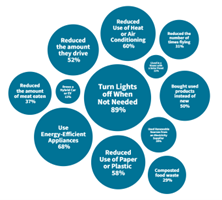Every Choice Counts
How We Can Slow Down Climate Change
Actions Americans have Taken to Reduce Impact on Climate change
We know that climate change is not some distant, abstract threat. We know that it is here, it is human-made, and the pace of temperature increases is accelerating. While most Americans have voiced concern for years, meaningful action from policymakers and corporations has fallen far short of what is required to save the planet. The world’s richest CEO is fixated on settling on Mars and many other members of the .01% club are building bunkers to survive the uninhabitable earth they are fast creating. But the fact is that we don’t have to wait for someone else to fix the environmental crisis we face. We have the power to slow and stop climate change.
The shift is already underway. Across the United States people are making more sustainable choices. These individual actions may seem small on their own, but collectively, they create momentum—convincing more people to take climate change seriously and sending a powerful message to businesses and elected officials that we demand a future rooted in sustainability, not the destruction of Planet Earth.
https://epic.uchicago.edu/insights/americans-views-on-climate-change-and-policy-in-10-charts/
One of the actions shown in the graphics above - reducing the use of heating or air conditioning - can measurably lower household emissions. The average U.S. household emits between 16,500 and 24,000 pounds of CO2 per year, making up about 20% of the nation’s total emissions. Nearly one-third of household electricity goes to heating and cooling. Lowering the thermostat by just 2°F in the winter can save around 2,000 pounds of CO₂ annually. Raising it 3°F in the summer can save another 1,000 pounds of CO2. Heating water makes up another 12% of electricity use. Shorter showers of 4 to 5 minutes can reduce emissions by about 700 pounds per year.
The average American family drives 14,000 miles annually, emitting roughly 1,000 pounds of CO₂ per 1,000 miles. But here’s the kicker—a third of all car trips are one mile or less. A distance that can be walked or biked, reducing emissions by 4000 pounds yearly.
What’s on our plates matters, too. Choosing a vegetarian meal just once a week can cut emissions by the same amount as driving over 1,000 miles. Replacing beef with less carbon-intensive meats like chicken is another powerful step—beef produces over 7 times the emissions of chicken per kilogram.
And then there’s plastic. It’s everywhere, and it’s choking our planet. Two-thirds of all plastic waste comes from single-use products, and globally, we’ve produced more than 7 billion tons of plastic waste—less than 10% of it has ever been recycled. In 2019 alone, plastics generated 1.8 billion tons of greenhouse gas emissions, and this number is expected to triple by 2060 if we don’t change course.
U.S. households generated over 51 million tons of plastic waste in 2021, with only 5–6% recycled. The rest ends up in landfills, incinerators, dumped into oceans or find their way to rivers and streams or blown away into the wilderness where wildlife either ingest them or get entangled in them or both. And with 2.5 million plastic bottles discarded every hour, it's clear we’re overdue for a shift.
The message is clear: our everyday choices matter. Every light switch, every step we take instead of driving, every meatless meal, every refillable water bottle we use are climate actions. Climate change is a global problem, but the solution begins at home.



